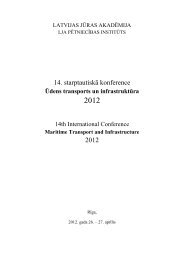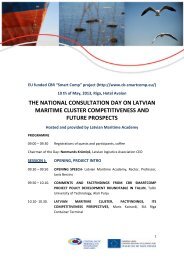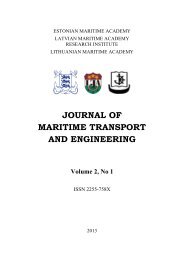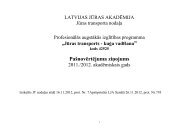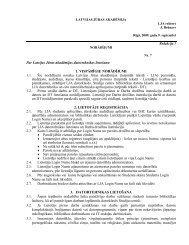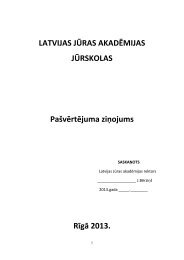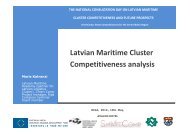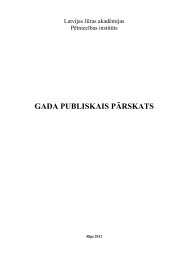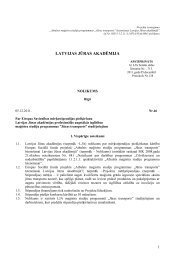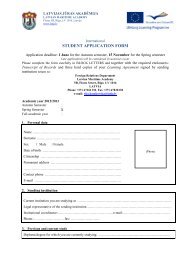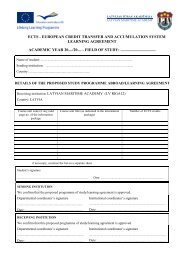Latvian Maritime academy
Latvian Maritime academy
Latvian Maritime academy
You also want an ePaper? Increase the reach of your titles
YUMPU automatically turns print PDFs into web optimized ePapers that Google loves.
PROPOSED ADVANCED TRAINING AND EDUCATIONAL<br />
METHODOLOGIES FOR TANKER AND GAS INDUSTRY<br />
Wael Khattab<br />
<strong>Maritime</strong> Transport Technology Department<br />
Arab Academy for Science, Technology and <strong>Maritime</strong> Transport<br />
Abu Quir Campus, Alexandria, Egypt<br />
E-mail: waelmdkhattab@yahoo.com<br />
Ibrahim El Attar<br />
Nautical Studies Department, Port Training Institute<br />
Arab Academy for Science, Technology and <strong>Maritime</strong> Transport<br />
Port Foad - Yaqout Village, Port Said, Egypt<br />
E-mail: ibrahim.elattar@pti-aast.org<br />
Abstract<br />
Oil and gas are considered to be among the world's most precious resources. Hence, no doubtfully, the<br />
oil and gas industry plays a significant role in the global economy. Petroleum itself is used for numerous<br />
products, in addition to serving as the world's primary fuel source. Furthermore, the processes and<br />
technologies concerned in producing and distributing oil and gas are highly complex, capital-intensive<br />
and necessitate state-of-the-art technology. Nonetheless, human resources operating these technologies<br />
in a safe efficient mode are more important. This fact is a reason for the main concern. What will be ideal<br />
global unified education and training methodologies provided by <strong>Maritime</strong> education & Training<br />
institutes in such critical rather indispensable industry to ensure "Safer Seas & Cleaner oceans" (IMO<br />
1994)? This paper will illustrate ideal training & education methodologies to be delivered to crew in<br />
campus or rather on-board as well as highlights current conventions for promoting skills and inducing<br />
quality for such dedicated rather crucial industry.<br />
Keywords: advanced training, maritime education, tanker and gas industry.<br />
Introduction<br />
Global standards for seafarer have been a major concern for the maritime industry which has shown<br />
the way to the birth of the STCW 78. It was expected that it would promote competence of seafarers.<br />
Consequently, it was widely welcomed by the industry as it was the first convention ever to be delivered<br />
by the IMO setting global minimum standards for seafarers. Later the maritime society realized by that<br />
the convention had not achieved its purpose. This was mainly because it lacked accuracy in its standards.<br />
In addition, implementation of the convention was left to the “satisfaction of the <strong>Maritime</strong><br />
Administrations”. This resulted in different interpretations by various administrations, thus there was an<br />
immanent need for revision.<br />
After the implementation, all member states have adopted and amended their curriculum according<br />
to the new requirements during a transitional period of five years, yet no crucial evidence can be obtained<br />
with reference to major improvement to seafarer’s competence due to many new tasks that remain<br />
unfinished to give full and complete effect to the convention globally. As the seven years period since<br />
1997 has been both a success and failure, it appears now that with new technologies introduced onboard<br />
(i.e. ECDIS, AIS, Integrated Bridge Navigation Systems, and Automation with respect to minimum safe<br />
manning onboard) there is a need to revise STCW, to keep the convention dynamic as it is supposed to<br />
be.<br />
Nowadays one of the key differences between the latest edition of STCW and its previous versions<br />
is the stress on competence rather than knowledge. STCW amendments stipulate in detail the required<br />
competences associated with different tasks, the knowledge and understanding required to perform them,<br />
methods for demonstrating competence and criteria for evaluating it.<br />
The hydro carbon industry and transportation<br />
The Figure 1 shows a noticeable decrease or non ascending tanker - gas carries causality rate. At<br />
present, the aim of maritime society is the application of modern technologies to board ship in order to<br />
achieve a zero causality rate. Nonetheless, an eminent problem of unification of <strong>Maritime</strong> education &<br />
28



